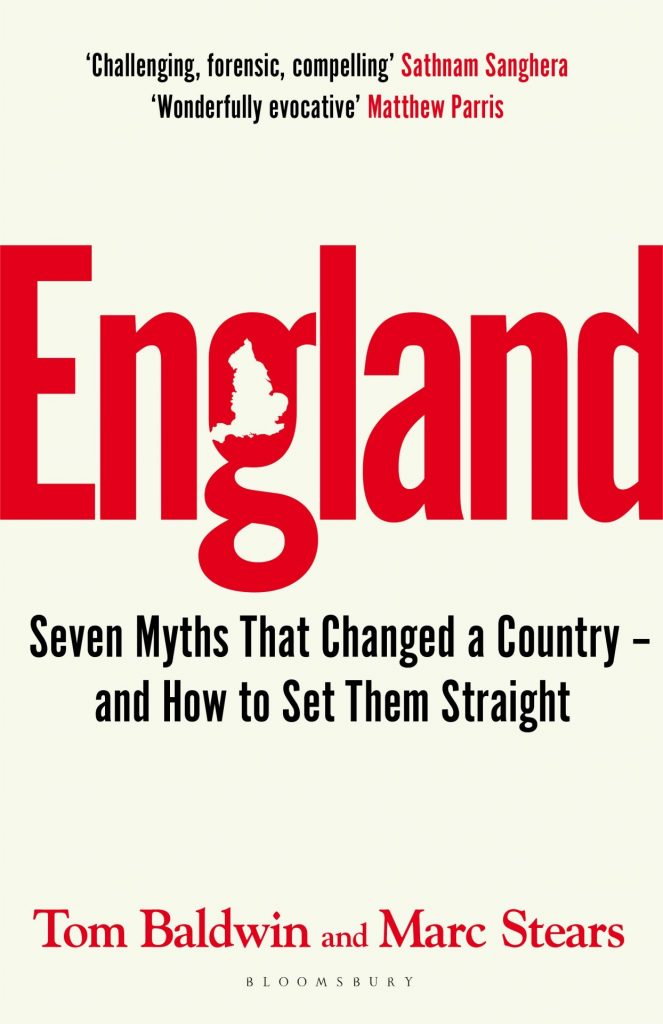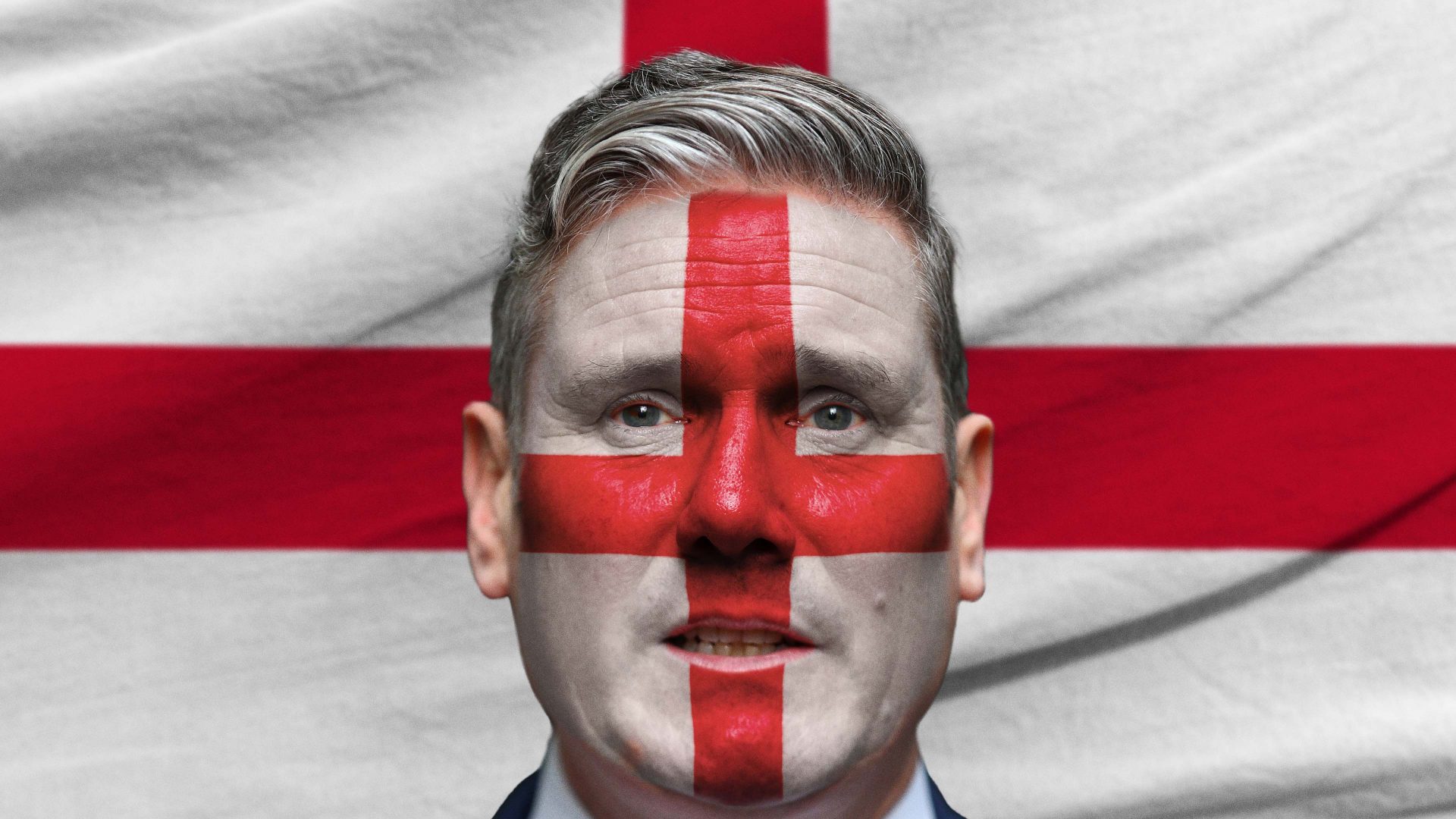A lot of what happened on St George’s Day this year was fairly predictable. Nadine Dorries wrote in the Daily Mail that anyone who is loyal and patriotic gets “mocked, belittled or openly scorned”. The Sun interviewed some cab drivers about the “bonkers ban” on flying the flag, while later on there were a handful of arrests outside a pub, following a Tommy Robinson rally attended by Laurence Fox in Whitehall.
At the same time, a slightly dishevelled centre-left crew, including the authors of this article, popped up in various places to wring our hands about inclusion and multiculturalism.
If this St George’s Day felt a little bit different, it was due to Keir Starmer’s decision to join the annual debate about English patriotism.
In a weekend article and then a video, the Labour leader talked about the NHS and the armed forces, service and respect. He also listed the moments in his life when he had felt most patriotic: becoming the first person in his family to go to university; climbing Scafell Pike with his severely disabled mother; “belting out the Three Lions” at Wembley during Euro ’96; fighting the death penalty in countries that “look up to this country’s rule of law”; meeting voters “who all seem to share the same stoic wit and decency”.
To some ears, this might sound a little cliched. After all, other countries have universities, mountains, football and functioning legal systems, not to mention voters. But Labour politicians have often struggled to express even a base level of patriotism, particularly when it comes to England rather than Britain. When Starmer urges his party’s candidates to “fly the flag” with pride, he’s asking many of them to go against some deeply ingrained habits that have served neither them nor Labour very well.
Many New European readers may feel a sense of belonging that extends beyond these islands, maybe feeling themselves citizens of Europe or of the world. But the former is no longer an option and the latter has never been available, other than rhetorically.
Although we might conceal our blue passports in those rather attractive “Bollocks to Brexit” covers, people living in England do not have much of a choice over whether England matters. It just does. Anyone disdaining anything for long enough stops paying attention to how it’s doing, and to how it might be improved. And that is dangerous, because it leaves to others the task of defining what this country is, and what it means.
It’s why Starmer’s list of patriotic moments is more remarkable than you might think. It contains none of those oversized, overly politicised, and now wearyingly familiar stories that we’ve heard so many times in the past decade. There’s nothing about the need to reclaim an ancient, lost liberty, which is somehow endangered by the European Court of Human Rights. There is also nothing about the importance of ruling the waves, or a return to an old-fashioned morality with which England once civilised a savage world.
Stories of this kind lead to a very different kind of patriotism than that set out by Starmer. Here is an inward-looking story of a magical island that needs more barbed-wired sovereignty and fewer foreigners to carry on – alone. Stirred in with this is the idea of the patriotic working class, which is portrayed as fighting an existential battle against the uncaring cosmopolitan elite. And, sitting on top of it all is the English Establishment, which supposedly keeps the national show on the road while maintaining everything just as it is.
Together, these engorged myths have resembled the barrage balloons once sent up into England’s skies to protect against the Luftwaffe. Their lines have become tangled and their bloated shadows have stopped the people living below from seeing past the battles over Brexit, and the forever culture war.
The result has been an increasingly stark and polarised debate about this country, especially during the Brexit campaign and its aftermath. At that time, pollsters like Rob Ford showed that attitudes to England and Englishness were at the centre of the argument about the future of the UK as a whole.
It is these myths that we seek to deflate in our new book, England: Seven Myths That Changed a Country – and How to Set Them Straight. In writing it, we travelled from muddy fields in the Home Counties to the port towns of Plymouth and Hull. We visited Wolverhampton in the old industrial heart of this country and a soulless new district on the edge of London. We spent weekends away in the worn-down resort of Blackpool, as well as the well-upholstered seat of learning that is Oxford.
In each case, the everyday England of people living in these places wasn’t the puffed-up version, with its empty abstractions and tired cliches of national greatness and exceptionalism. Instead, they were quieter stories of a complex and muddled nation that can yet point the way to a more hopeful future.
We began in Runnymede on a water-logged patch of land next to the Thames on which the Tory politician Daniel Hannan had proclaimed “an event of truly planetary significance took place”. This was, according to the man who later became a sort of intellectual figurehead for Brexit, the exact spot where England “invented liberty” because, back in 1215, some French-speaking barons had extracted some concessions from King John.
This myth of Magna Carta, one that has flickered through English history, became the focus of political attention 800 years later when a commemorative festival was held and three big memorials were built on the site.
It was funded by David Cameron’s government just a month after he had won an election in which he had successfully stoked English fears about the growing influence of the Scottish government, and the possibility of an SNP/Labour coalition.
On Magna Carta’s big day in June 2015, the then prime minister had a Spitfire fly overhead as he made a speech attacking the Human Rights Act and fumbling around in Euro-phobic erogenous zones, a dangerous pastime as he was to discover a year later with his disastrous Brexit referendum.
Strip away the myth, however, and you can find a very different English version of liberty in and around Runnymede. The families taking a dog for a walk on a drizzly Sunday afternoon aren’t thinking about national exceptionalism so much as whether to buy a scone at the National Trust tearoom around the corner.
Similarly, the thousands of British Hong Kongers who fled the threat of tyranny to cluster in the Surrey suburbs nearby have not chosen this corner of the country because of Magna Carta (most people we spoke to had never heard of it) but because it’s a place so ordinarily dull that they can take freedom for granted.
Next stop was Plymouth, a city whose identity has been built around a myth of the Battle of the Armada, buccaneers and Francis Drake’s derring-do (but generally ignores his pioneering role in the slave trade). And like Magna Carta, the story of buccaneering Britain was co-opted by the Leave campaign, with those “Brexiteers” inserting that extra “e” by way of tribute.
Leave-supporting politicians channelled their inner Drakes, to declare that the nation’s destiny was in the wide expanse of the oceans, rather than in Europe. David Davis, who was put in charge of negotiations to leave the EU, said “our history is a trading, buccaneering history – back to Drake and beyond – that’s what we’re good at”, and as prime minister, Boris Johnson later invoked the same mythology of “seafaring ancestors… whose exploits brought not just riches” to explain his vainglorious quest for a post-Brexit Global Britain.
And yet it’s in Plymouth where England’s long relationship with the sea is being adapted once again. The city’s university is a world leader in developing green technology, including offshore floating windfarms that are far more relevant to our future independence and security than any story of a buccaneering pirate or slave-trader.
Hull is another port with a strong mythical narrative, in this case the redemptive, if flawed, myth of William Wilberforce’s campaign against the slave trade, and the supposedly “liberating” mission of the British empire. The 19th century’s moral conviction that people can and must be improved still resonates today in Hull, not least in the debate about “benefit cheats” and the “undeserving poor”, the “workshy” or “sicknote” younger generation.
But Hull is also full of dissonance, a place of unexpected beauty in people’s refusal to conform. It is a place where Philip Larkin, industrial music and streets with mysterious names like “Land of Green Ginger” resonate more than a long-dead evangelical like Wilberforce, who is immortalised in marble far away at Westminster Abbey.
In Wolverhampton, we examined the hate-filled English myth of racial insularity with which the city’s former MP, Enoch Powell, had once poisoned much of England. You can find that same rancid flavour in this current government finally getting parliament’s permission to start transporting asylum seekers to Rwanda, with its Powellite echo of “sending them back to Africa”.
In Wolverhampton itself, however, there is real hope to be found in the way genuinely diverse groups realise they all now share this city.
Such ground might still be disputed, as we saw in an arcane planning battle over car parking for a Sikh temple, or shared through support for the local football club, which has opened itself out to all communities including the “Punjabi Wolves” fans who bring the dohl drums to away games.
This cuts sharply against the idea of England as a failed multicultural state. But yet another political myth is that the country has turned its back on a left-behind white English working class. If that were true, then Blackpool would be the place to see it. But at this seaside resort we found real cause for optimism not in some sepia-tinted end-
of-the-pier show, but in the multiple ways people are just getting on with the job of caring for each other.
Chipping away at seemingly immovable problems in towns like these is more deserving of investment than the endless big headline-grabbing initiatives that achieve almost no change.
And yet, the culture-warrior propaganda suggests that academia and cultural institutions have been captured by some liberal-left orthodoxy. The public, however, don’t see it that way. According to polling by the UCL Policy Lab and More in Common, just 3% of English voters think professors are part of the “establishment” and fewer than one in eight think the establishment is “woke”.
Significantly, Keir Starmer seems to have recognised this, and has said that the way the Conservatives had “denigrated some of our proudest national institutions – from the BBC, to the National Trust and England football team” – meant they were no longer a “patriotic party”.
One institution that the Tories have not denigrated is Oxford, perhaps because so many party leaders, and Tory PMs, have been there. Starmer also attended Oxford. The tourists flock to its honeyed-stone heritage, but it is still a city that has over-priced housing, factories and a local population that never steps inside any part of the famous old university.
But the institutions of Oxford can still have huge consequences for the lives and experiences of the people who live in this country. That was shown by the Oxford/AstraZeneca Covid vaccine, invented by under-funded scientists such as Sarah Gilbert in an unfashionable part of the city far from any dreaming spire, then rolled out to a patient public through dowdy NHS health centres and GP surgeries.
It certainly felt a whole lot more “English” than the tinted-glass new seats of learning being financed across Oxford by billionaire donors.
Our account of England and our sources for an updated sense of patriotic pride are, of course, as subjective as that of the Daily Mail or, for that matter, Starmer. But our point is precisely that there isn’t a single, one-size-fits-all version of England.
The Labour leader’s focus on the unexceptional, the prosaic and the everyday aspects of England may risk reinforcing the view held by some people that he’s not very inspiring. Like any politician, he isn’t perfect. Nor is England itself.
And yet in this ordinariness, Starmer now has the chance to fit better into the folds of this muddled old country than most of those people who’ve tried to run it recently.
Tom Baldwin and Marc Stears’ England: Seven Myths That Changed a Country – and How to Set Them Straight, is published by Bloomsbury




